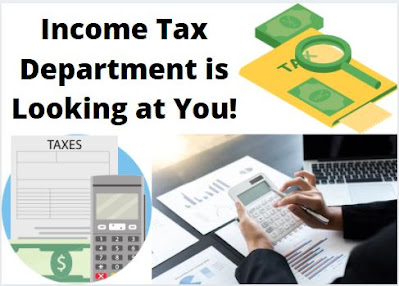Bogus HRA Exemptions tracked automatically
-Dr. Lalit
Kumar Setia
The statement of annual information tracks the
financial dealings of an individual with a PAN number. Like 26AS – Tax Credit
Statement, the AIS can be downloaded by logging in to the incometax.gov.in
portal.
PAN number relating dealings are tracked automatically
Wherever the bank account is opened, it is a must to mention the PAN number. Whenever any interest be credited in the saving or
fixed deposit bank account, it will automatically be tracked in the Annual
Information Statement (AIS). An individual has to verify only, at the time of
filing the income tax return. Similarly, the income from dividends or income
from the sale of sales, everything is connected with an account, opened with the
PAN number.
Rental income will automatically be tracked
The employees in the job, require to give the PAN number of
the landlord, to whom they are paying the rent. The employer while giving the
HRA exemption, requires to insert the PAN number of the landlord to whom the rent is
paid by the employee. This information will be included in the Annual Information
Statement of the person whose PAN number is provided by the employee and
submitted by the employer to the income tax department. The rental income will
automatically be mentioned in the pre-filled income tax return of the person
whose PAN number is mentioned.
Bogus HRA exemptions will be tracked automatically
Mr. A in Jhajjar Haryana is working in a Government job
in Gurgaon. When his drawing and disbursing officer asked him to provide the
PAN number of the landlord, for getting exemption on the HRA amount, he submitted
the name and PAN number of the landlord.
In case, he is not providing the PAN number of the
landlord and the amount of monthly rent paid is above Rs. 8000 (eight thousand)
rupees, then the DDO will not give any tax exemption. The rent receipts are
required to be submitted to the DDO and even the rent agreement or declaration
is required.
The Annual Information Statement of the landlord will
intimate him/her that he/she earned from the rental income and he/she has to
report the same in the income tax return.
Section 194I is particularly for TDS on rent paid
As per the income tax act, the individuals who are paying
monthly rent above Rs. 50 thousand, require to deduct TDS @5% at the time of
paying rent to the landlord. The TDS will be deposited by the individual using
his PAN number and it will automatically disclose the income of the landlord to
the income tax department. In case, the landlord did not report any rental
income, he/she will get a notice from the income tax department.
False Rent Paid Declaration may be tracked automatically
It is also possible that the employees mention the PAN
number of another person to the employer in the self-declaration. It is also
possible that the employees are giving fake rental receipts to the employer.
The bogus declaration of the HRA with PAN number will show the rental income
in the AIS of a genuine person. The genuine person may submit feedback on AIS
citing the amount mentioned in the pre-filled income tax return or AIS is
incorrect. In such a case, the false rent paid declaration will be tracked
automatically.
*Copyright © 2021 Dr. Lalit Kumar. All rights reserved.
All
Intellectual Property rights including Copyright etc. are reserved and vested
exclusively with the author or editor, Dr. Lalit Kumar. No part of the material
contained in this webpage may be reproduced or transmitted in any form or by
any means, electronic, technical, photocopying, recording or otherwise, or
stored in any retrieval system of any nature without the written permission of
the author or editor, Dr. Lalit Kumar.
This content is written by Dr. Lalit Kumar Setia; a renowned author and trainer. He completed his Doctorate in Commerce from Kurukshetra University Kurukshetra and MBA in Information Technology from GJU, Hisar. He also wrote two books, 15 research papers, and organized more than 200 Training Courses during his working period since 2006 in Haryana Institute of Public Administration, Gurugram. The article was published on 23rd December 2021 and last updated on 23rd December 2021. The writer can be contacted on lalitkumarsetia@gmail.com
More Articles
https://drlalitsetia.blogspot.com/p/new-articles-study-material-notes.html





















